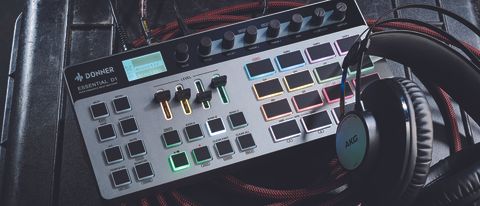MusicRadar Verdict
It doesn’t reinvent the wheel, but the D1 offers a lot of functionality and versatility for a not unaffordable price.
Pros
- +
Fairly capable and versatile sound engine offers decent flexibility for the price.
- +
Straightforward, intuitive workflow.
- +
High quality factory sounds and patterns.
Cons
- -
Fixed track parameters hinders flexibility slightly.
- -
A few functional annoyances.
- -
Some controls are a little fiddly and cramped.
MusicRadar's got your back
Donner Essential D1 Beat Machine: What is it?
Chinese brand Donner is well established in the worlds of guitars, stage pianos and drums, but the D1 is only its second foray into the realm of electronic music gear. The first was last year’s B1 Analog Bass Sequencer, a budget TB-303-inspired synth that pleasantly surprised us when we reviewed it last year.
Now Donner has followed up with the D1 drum machine. As with most of Donner’s instrument range, the focus here is on affordability. The D1 lands at an already reasonable sub-£300 price point, but it’s worth noting that the B1 price has dropped by almost half since launch, so that may well come down further too.
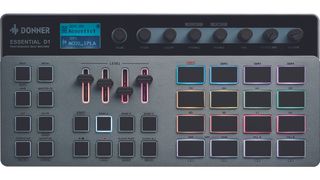
Hook it up
The D1’s connectivity options are fairly standard for this sort of machine. Outputs come in the form of a stereo pair of jacks and a headphone out. There are full-sized MIDI in and out ports. The addition of an audio input is a nice touch though, handy for creating compact hardware setups.
The D1 also has a USB-C port, allowing it to be connected to a computer for both MIDI control and use with Donner’s Donner Connect software, which is used as a patch librarian, for firmware updates and to manage the onboard sample library. This is pleasantly simple in use, allowing drag and drop import of sounds, that are automatically converted to the correct format.
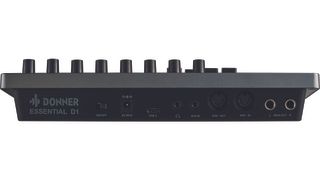
Donner Essential D1 Beat Machine: Performance and verdict
The D1 is a 12-track sample-based drum machine. Like its synth predecessor, it comes in a compact and lightweight unit decorated in a range of grey and black tones that give it a look that feels more ‘office supplies’ than creative instrument. To be fair, once you turn the D1 on its multi-colour back-lit pads instantly give it more vibrancy.
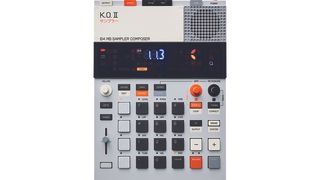
• Teenage Engineering EP-133 K.O.II
It’s less playable than the D1, but TE’s groovebox is a little more inspiring and – crucially – can sample.
• Elektron Model:Samples
Some of the D1’s more tweakable features are clearly inspired by Elektron’s flexible sequencing options.
• Korg Drumlogue
Korg’s compact machine is a little more ‘pro’, with added analogue sounds and deeper sequencing, without a massive jump up in price.
The control interface is largely occupied by three pad grids, the smaller two of these are used for browsing and selecting parameter functions, along with transport, while the larger 4x4 grid is used as the primary space for playing and sequencing. Alongside these pads, the D1 sports four faders, used for adjusting the level of the 12 drum tracks – the pads below are used to switch between three banks of sounds – and a bank of eight rotaries along the top edge used for selecting and shaping sounds.
On the whole, the interface feels well designed. There’s not masses of travel from the short faders, and the parameter rotaries can be a little fiddly, but the all-important playing/sequencing area is well spaced out and, feels solid and responsive.
Beats can be programmed in one of two ways – either by using the pad grid as a step sequencer, or by hitting record and live playing the pads. In either case, patterns can be up to 64 steps in length. A handy sub-step function increases the resolution between steps, allowing hits to be nudged or recorded off-grid, and for additional triggers to be inserted to create rolls and flams. Two of the pads along the bottom row of the playing grid are used to trigger beat rolls, in either 16, 32 or 64-note divisions, although it’s a shame that you can’t currently trigger rolls in triplet timing.
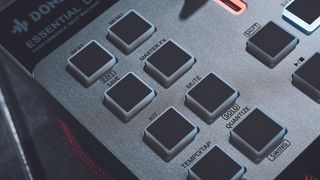
The remaining two pads in this lower row are used to edit and engage two fill slots. These are programmed in the same manner as the main beat and can be triggered to add variation to patterns. The D1’s song function also allows up-to four beats to be loaded with each patch, which can be chained or switched between, all of which adds up to a decent amount of flexibility for times when you might be creating longer compositions or performing.
The D1 also features parameter locking automation for its 12 sounds. Each channel can make use of any sample from the D1’s memory – always mono, 44.1kHz/16-bit – but the editable parameters for each change depending on the track in use.
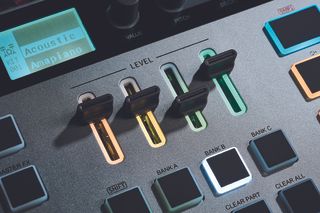
All sounds come with pitch, decay length, level and pan controls, but the remaining parameter 1 and 2 controls change from channel to channel. In the case of the kick, for example, these adjust low pass cutoff and distortion, while the snare gets a high-pass filter with resonance. For the four generic sample slots – housed in the top row of pads – these parameters control the start and end points of the sample playback. It’s a slight shame that these can’t be used to reverse the sample playback.
The fact that these parameter controls are fixed to set tracks is a little limiting, as it means, for example, you can’t have two distorted kicks in a single kit. The choice of parameters is well thought-out though, and offers decent flexibility whilst keeping the workflow straightforward.
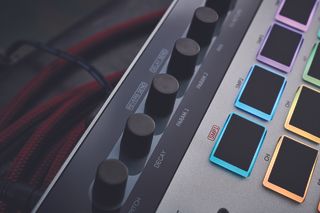
Beyond these parameters, the D1 also has delay and reverb sends and a master bus compressor. Each of these is comprehensive, with BBD and digital modes for the delay, plus Room, Hall, Church and Plate reverbs, and full control of the compression parameters. In all, there’s more than enough here to get a polished, tight drum sound, whether using your own samples of those from the factory library.
There’s little you’d call truly original here – most features are either staple functions, or borrowed
On that front, it’s worth commenting on the quality of the library sound and patterns, which are provided by Loopmasters, and are both excellent quality, and pleasantly eclectic. These touch on amapiano, trap, reggaeton, acoustic drums and lo-fi hip-hop, as well as staple house, techno and drum & bass sounds.
On the whole, there’s little that you could call truly original here – most features are either staple functions, or good ideas borrowed from higher-priced gear. That’s not necessarily the worst thing; while the D1 might not inspire creativity like, say, Elektron’s Model:Samples or Teenage Engineering’s KOII, it’s a solidly built and versatile workhorse for studio and performance use.
MusicRadar verdict: It doesn’t reinvent the wheel, but the D1 offers a lot of functionality and versatility for a not unaffordable price.
Donner Essential D1 Beat Machine: Hands-on demos
Donner Music
Starsky Carr
loopop

TAETRO
Donner Essential D1 Beat Machine: Specifications
- KEY FEATURES: 12-track sample based drum machine with 64-step sequencer i/0: 2x TS main out, TRS headphone out, TRS aux in, MIDI in and out, USB-C.
- CONTACT: Donner
I'm Editor-in-Chief of Music Technology, working with Future Music, Computer Music, Electronic Musician and MusicRadar. I've been messing around with music tech in various forms for over two decades. I've also spent the last 10 years forgetting how to play guitar. Find me in the chillout room at raves complaining that it's past my bedtime.

Music theory you can use: 6 chord tricks for songwriters and producers

Former Oasis drummer Alan White teases photo of Don’t Look Back in Anger bass drum head ahead of Oasis reunion

Thomann’s latest 70th anniversary deals just dropped - including bonkers birthday discounts on Taylor, Arturia, Darkglass, Behringer, Baby Audio and loads more
